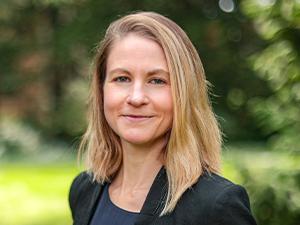
Whitney Phillips
Biography
Drawing from an interdisciplinary humanities background that includes creative approaches to nonfiction writing, I explore the politics and ethics of information: how it impacts elections, public discourse, relationships, and individual wellbeing. Some of the information I study is true. Some is false. Some is somewhere in between. Some is harmful and some is helpful. Some comes from jokes, conspiracy theories, rumors, religious beliefs, quasi-religious beliefs, conversations with friends. Some is shared online and some is shared offline. What I am interested in is what the information does.
My qualitative methods reflect my humanities (literary/cultural theory/folklore) training: participant observation, rhetorical analysis, textual analysis, and symbolic analysis. I use these methods to develop cultural histories of the groups and issues I study.
In 2025, I published The Shadow Gospel: How Anti-Liberal Demonology Possessed US Religion, Media, and Politics (MIT Press), which traces the 80-year-old quasi-religious history of the figure of the "liberal devil" within conservative and Evangelical media. I am in the process of completing a follow-up manuscript, titled Popular Demonology, that explores how political myth, storytelling, and ritual have spread ideas about the "liberal devil" far beyond conservative networks -- including among those who identify as liberal.
In the Media Studies program at SOJC, I teach Intro to Media Studies, Media Ethics (with a true crime focus), Cross Cultural Monster Narratives, and courses on elections during presidential and midterm election cycles. I am a core faculty member in the Folklore Program.
Education
- PhD in English with a folklore structured emphasis (digital culture focus) from the University of Oregon (2012)
- MFA in creative writing from Emerson College (2007)
- BA in Philosophy from Humboldt State University (2005)
Publications
Major published works include:
- The Shadow Gospel: How Anti-Liberal Demonology Possessed US Religion, Media, and Politics (The MIT Press), co-authored with Mark Brockway, 2025.
- Share Better and Stress Less: A Guide to Thinking Ecologically about Social Media (Candlewick Press/MITeen), co-authored with Ryan Milner, 2023.
- You Are Here: A Field Guide for Navigating Polarized Speech, Conspiracy Theories, and Our Polluted Media Landscape (MIT Press), co-authored with Ryan Milner, 2021.
- “The Oxygen of Amplification: Better Practices for Reporting on Extremists, Antagonists, and Manipulators Online.” Data & Society, 2018.
- The Ambivalent Internet: Mischief, Oddity, and Antagonism Online (Polity Press), co-authored with Ryan M. Milner, 2017.
- This is Why We Can’t Have Nice Things: Mapping the Relationship between Online Trolling and Mainstream Culture (MIT Press), 2015.
Book chapters, articles, and cultural critiques include:
- W. Phillips. “Tuning in to Rightwing Laughter: Donald Trump, the MAGA Bible, and the Fun of Fighting Liberals." In Folklore and Democracy, edited by Anthony Bak Buccitelli. University of Mississippi Press, 2025.
- W. Phillips and R. Lawrence. "It's Not Just the Fruit, It's the Factory Farm: Assessing the Past, Present, and Future of January 6." In January 6th and the Media, edited by Kadijah Costley White, Daniel Kreiss, Shannon McGreggor, and Rebekah Tromble. Oxford University Press, 2024.
- W. Phillips, M. Brockway, and A. Ohlheiser. “The Term ‘White Christian Nationalism’ is on the Rise. Here’s What Journalists Should Know about Using It.” Nieman Journalism Lab, 2022.
- W. Phillips. “How to Cope with Political Panic.” NBC, 2022.
- W. Phillips and C. Wardle. “Disinformation Goes to Hollywood: Four Lessons from Journalism.” First Draft News, 2021.
- W. Phillips. “Light Disinfects: A Cultural History and Critique.’” Georgetown Law Technology Review, Special Issue on Network Ecologies, 2020.
- W. Phillips. “It Wasn’t Just the Trolls: Early Internet Culture, ‘Fun,’ and the Fires of Exclusionary Laughter.” Social Media and Society’s 2K. April, 2019.
- W. Phillips. “Am I Why I Can’t Have Nice Things?: A Reflection on Personal Trauma, Collective Play, and Ethical Sight.” In A Networked Self and Love, ed. Zizi Papacharissi. London: Routledge, 2018.
- W. Phillips and R.M. Milner. “Ghosts in the Machines: How Centuries of Technological Play with Death Has Helped Make Sense of Life.” In A Networked Self: Birth, Life, and Death, ed. Zizi Papacharissi. London: Routledge, 2018.
Media Coverage
I have written numerous popular press pieces for publications such as The Atlantic, The New York Times, NBC, and Slate, including the work I published in my WIRED magazine Ideas column. I regularly provide expert commentary on national and global news stories and my work has been profiled by the Columbia Journalism Review, Niemen Journalism Lab, and Knight Commission on Trust, Media, and Democracy, among many others.
Honors and Awards:
I have been invited to deliver dozens of talks and have given a number of national and international keynotes focused on a range of journalism and communication topics, including journalistic ethics, K-12 media literacy education, and the relationship between wellbeing and information sharing. I’ve also had the opportunity to present my work to Congressional and other governmental entities and am regularly asked to provide ethics consultation for national and global news outlets. My first book, This Is Why We Can't Have Nice Things, was awarded the Association of Internet Researchers' Nancy Baym best book award.
